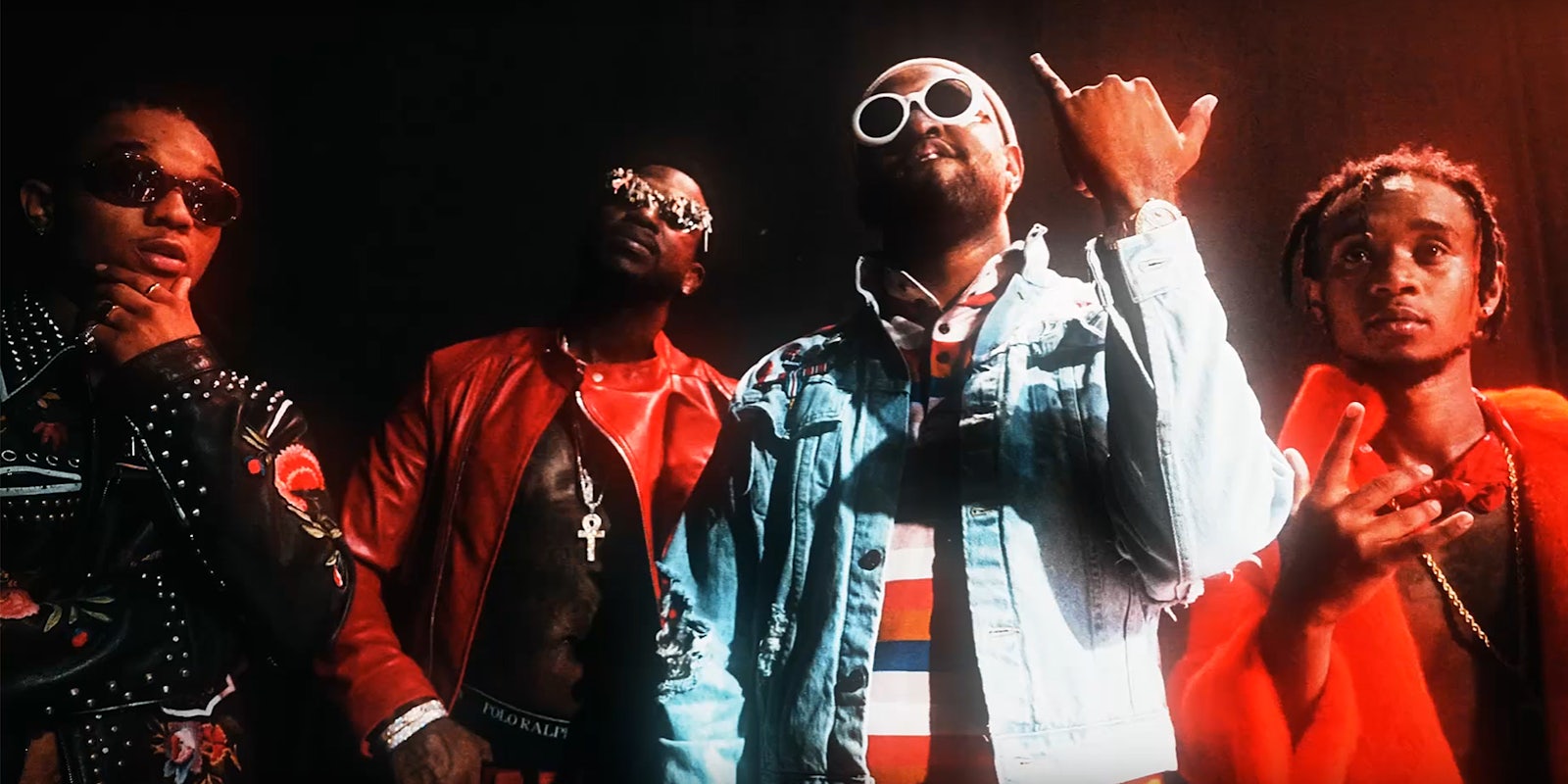From hashtags and memes to videos, black virality was a way to cope with the horrors and devastating losses of 2016.
Black virality has become an integral part of our online consumption. A social media star comes and goes in the blink of an eye, but in most of those instances, we witness genius being created in real time, by black people.
2016 birthed a number of those instances, the most recent one being the Mannequin Challenge. Although the viral trend began at high schools across the country, Rae Sremmurd elevated it to the mainstream.
https://www.youtube.com/watch?v=wv7q1RF8UrU
In this video, the turnt-up rap siblings and some friends remain immobile onstage, as the camera slowly pans to the other side, showing a venue full of fans following suit. “Go crazy, “ Swae Lee yells, the crowd moving wildly as “Black Beatles” kicks in.
From that point on, any and all Mannequin Challenge videos were soundtracked with “Black Beatles.” This one. This one. This one. You’ve seen them. The beauty of the viral trend was that each told a different story, most times for comedic effect but others to offer a commentary, too. Such was the case with this Mannequin Challenge:
Yep.. they won.. game over! pic.twitter.com/dEh65hemly
— 🟣BIG LAKESHOW🟡 (@KP_Trill) November 10, 2016
This poignant video isn’t soundtracked by “Black Beatles” but a collection of audio from different police brutality cases, as raised fists accompany a snippet of Malcolm X’s “By Any Means Necessary” speech. It shows the way even throwaway viral trends can be harnessed something more profound and impactful.
The Mannequin Challenge catapulted “Black Beatles” to No. 1 on the Billboard singles chart. Something similar happened with Migos’ “Bad & Boujee,” which saw its own rise to the No. 1 spot after a number of memes were made in its honor.
I’m mad this fit so well pic.twitter.com/t8eHJgO5UE
— Nate Z (@NathanZed) December 27, 2016
It was inevitable that 2016 would produce some memorable memes, given that it was underscored by one of the most polarizing presidential elections in America’s history. Each presidential debate came with a new collection of memes, but one in particular still resonates. Reggie Sergile, better known as the battle rapper Conceited, became a viral sensation when a video clip of him turned into a meme.
#debates Moderator: Let’s talk about race.
— Raquel Willis (she/her) (@RaquelWillis_) September 27, 2016
Me: pic.twitter.com/Lob5QppGwz
Although Sergile’s reaction first popped up as a GIF back in 2015, it wasn’t until the presidential debates that his face was seen everywhere. From this one to this one, Sergile’s face was the comedic relief many of us needed to see in the face of Trump’s championing of “Stop and Frisk” policies and talk of failing inner cities.
Black people played a pivotal part in many of the year’s most important memes: the blurred Mr. Krabs memes, the Arthur memes, the dark Kermit memes, and the #UNameItChallenge.
Of course, any discussion about black virality would be incomplete without acknowledging #BlackLivesMatter. Since 2013, the Black Lives Matter movement has remained an important voice for social justice not only in America but across the world, with its hashtag keeping people informed of the daily injustices endured by black people.
The Black Lives Matter movement has created a platform for the voiceless. Black people such as Alton Sterling, Philando Castile, Keith Lamont Scott, Terence Crutcher, and Korryn Gaines have been immortalized through hashtags and headlines, and they are survived by a community of people who want justice in their absence.
Although 2016 was a banner year in black virality, it was indicative of a problem that persists within the wild west of internet phenomenon: accreditation. Black virality has resulted in some of the most memorable internet sensations throughout the years, and yet many of the creators never receive monetary compensation—let alone credit—for their work.
Such was the case with Kayla Newman of “on fleek” fame. Since uttering the phrase on Vine on June 21, 2014, Newman’s invention has been printed on apparel, used to sell breakfast items, and much more.
https://www.youtube.com/watch?v=XrTVMXxop3o
“I gave the world a word,” Newman said in an interview with Fader. “I can’t explain the feeling. At the moment I haven’t gotten any endorsements or received any payment. I feel that I should be compensated. But I also feel that good things happen to those who wait.”
Sure, there have been some exceptions: Instagram and Vine star Niles Stewart played an important part on the first season of Donald Glover’s critically acclaimed Atlanta, portraying a black teenager who believes he’s a 35-year-old white man. Fellow Instagram star Bankroll PJ was also featured on the show.
https://www.youtube.com/watch?v=MpEdJ-mmTlY
But many of the stars behind these moments are rarely, if ever, credited or compensated for their contributions to the culture. Their content is considered free for the taking because of its intangibility.
Hopefully, that will change at some point. But black virality will continue to shaping culture, both online and off-. Here’s to seeing what 2017 brings us, and the ways in which black people innovate through social media time and time again.


